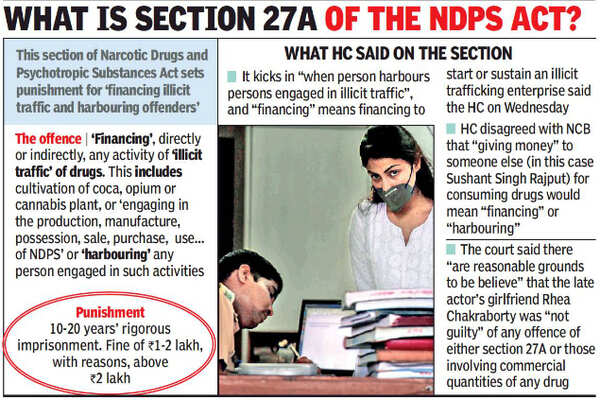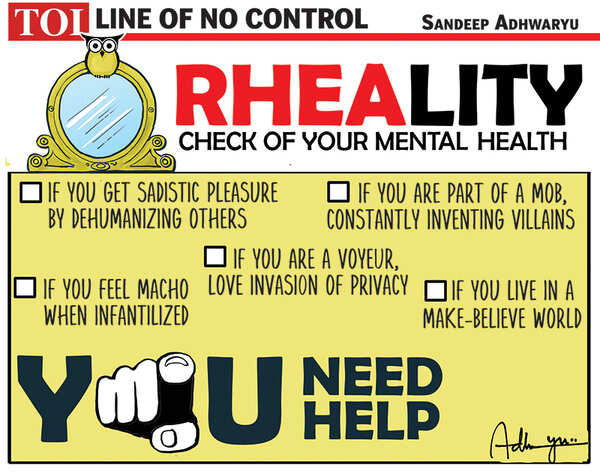- News
- entertainment
- Bombay HC explains why narco section slapped on Rhea Chakraborty does not hold
Trending
This story is from October 9, 2020
Bombay HC explains why narco section slapped on Rhea Chakraborty does not hold
The Statement of Objects and Reasons of the 1989 Amendment of the NDPS Act of 1985 mentions that India was facing a problem of transit traffic in illicit drugs," said Justice Sarang Kotwal in an important finding on the scope of section 27A of the NDPS Act, while granting bail on Wednesday to actor Rhea Chakraborty. The HC said that they felt a need to amend the law.

Bollywood actress Rhea Chakraborty arrives at Santacruz police station, in Mumbai. (PTI)
MUMBAI: The Bombay high court has held that an offence of "financing illicit traffic and harbouring" under the country's drug law was introduced two decades ago to tackle and curb these activities which formed the "root cause" of illicit trafficking.

The offence, under section 27A of the Narcotic Drugs and Psychotropic Substances (NDPS) Act, which attracts 10-20 years' imprisonment, was introduced as a separate offence in 1989 soon after the 1988 UN Convention against Illicit Trafficking in Narcotic Drugs and Psychotropic Substances. India ratified the UN convention that "recognizes illicit traffic is an international criminal activity, the suppression of which demands urgent attention and the highest priority".
"The Statement of Objects and Reasons of the 1989 Amendment of the NDPS Act of 1985 mentions that India was facing a problem of transit traffic in illicit drugs," said Justice Sarang Kotwal in an important finding on the scope of section 27A of the NDPS Act, while granting bail on Wednesday to actor Rhea Chakraborty, who was late actor Sushant Singh Rajput's girlfriend. "The spillover from such traffic was causing problems of abuse and addiction. Therefore, a need was felt to amend the Law to further strengthen it."

There already was existing in the NDPS Act at the time prohibitory provisions against dealing in drugs under section 8, which says that no person shall produce, possess, sell, buy (or do a host of things including transporting and warehousing) any NDPS except for medical or scientific purposes.
"(It) wanted to attack the basic cause of illicit traffic of drugs," said the judge. The financing of a drug enterprise and sustaining it and hence the term 'financing' in the section had to be interpreted as something beyond mere buying and selling of drugs. "The prohibitory section 8 was already existing... Therefore, a separate section 27A was introduced to check these activities which were the root cause of illicit traffic," he said, adding that hence, "financing" and "harbouring" were specifically mentioned. The "financing" in the section denotes "financial support which directly or indirectly is cause of existence of such illicit traffic" the judge said. "It refers to activities involving illegal trade or business."
"The allegations against Rhea Chakraborty of spending money in procuring drugs for Sushant Singh Rajput will not, therefore, mean that she had financed illicit traffic," the HC held.
On the other key term, "harbouring", the HC held that it "means there has to be another offender who has committed the offence." "The person who is charged with harbouring that main offender should have supplied him with shelter, food" and the requirement is that the harbouring "should have done this to prevent the main offender's apprehension (arrest)". But in the NCB case against Rhea, the HC noted, "no criminal case or FIR was pending against Sushant Singh Rajput".
Meanwhile, Samuel Miranda and Dipesh Sawant, who got bail along with Rhea, were released from Taloja, Navi Mumbai, on Thursday.
Watch Rhea Chakraborty is not guilty of any offence under Section 27A of NDPS Act, Bombay HC explains how

The offence, under section 27A of the Narcotic Drugs and Psychotropic Substances (NDPS) Act, which attracts 10-20 years' imprisonment, was introduced as a separate offence in 1989 soon after the 1988 UN Convention against Illicit Trafficking in Narcotic Drugs and Psychotropic Substances. India ratified the UN convention that "recognizes illicit traffic is an international criminal activity, the suppression of which demands urgent attention and the highest priority".
"The Statement of Objects and Reasons of the 1989 Amendment of the NDPS Act of 1985 mentions that India was facing a problem of transit traffic in illicit drugs," said Justice Sarang Kotwal in an important finding on the scope of section 27A of the NDPS Act, while granting bail on Wednesday to actor Rhea Chakraborty, who was late actor Sushant Singh Rajput's girlfriend. "The spillover from such traffic was causing problems of abuse and addiction. Therefore, a need was felt to amend the Law to further strengthen it."

There already was existing in the NDPS Act at the time prohibitory provisions against dealing in drugs under section 8, which says that no person shall produce, possess, sell, buy (or do a host of things including transporting and warehousing) any NDPS except for medical or scientific purposes.
"(It) wanted to attack the basic cause of illicit traffic of drugs," said the judge. The financing of a drug enterprise and sustaining it and hence the term 'financing' in the section had to be interpreted as something beyond mere buying and selling of drugs. "The prohibitory section 8 was already existing... Therefore, a separate section 27A was introduced to check these activities which were the root cause of illicit traffic," he said, adding that hence, "financing" and "harbouring" were specifically mentioned. The "financing" in the section denotes "financial support which directly or indirectly is cause of existence of such illicit traffic" the judge said. "It refers to activities involving illegal trade or business."
"The allegations against Rhea Chakraborty of spending money in procuring drugs for Sushant Singh Rajput will not, therefore, mean that she had financed illicit traffic," the HC held.
On the other key term, "harbouring", the HC held that it "means there has to be another offender who has committed the offence." "The person who is charged with harbouring that main offender should have supplied him with shelter, food" and the requirement is that the harbouring "should have done this to prevent the main offender's apprehension (arrest)". But in the NCB case against Rhea, the HC noted, "no criminal case or FIR was pending against Sushant Singh Rajput".
Meanwhile, Samuel Miranda and Dipesh Sawant, who got bail along with Rhea, were released from Taloja, Navi Mumbai, on Thursday.
Watch Rhea Chakraborty is not guilty of any offence under Section 27A of NDPS Act, Bombay HC explains how

About the Author
Swati DeshpandeSwati Deshpande is Senior editor at The Times of India, Mumbai, where she has been covering courts for over a decade. She is passionate about law and works towards enlightening people about their statutory, legal and fundamental rights. She makes it her job to decipher for the public the truth, be it in an intricate civil dispute or in a gruesome criminal case.
FOLLOW US ON SOCIAL MEDIA









